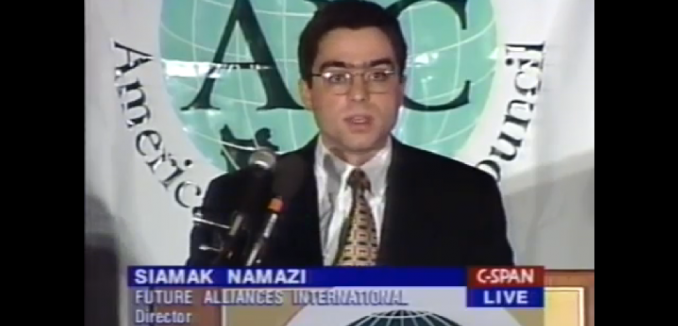Siamak Namazi, an Iranian-American businessman who has long advocated for closer ties between Washington and Tehran, was arrested two weeks ago by the intelligence arm of Iran’s Islamic Revolutionary Guard Corps (IRGC), The Wall Street Journal reported (Google link) Thursday.
About two weeks ago, Siamak Namazi, the head of strategic planning at Crescent Petroleum Co., was arrested as he was visiting relatives in Tehran from his home base in Dubai, according to people briefed on the situation. He was arrested, they said, by the Guard’s intelligence arm, which reports to Supreme Leader Ayatollah Ali Khamenei, not the government.
Mr. Namazi’s arrest will further complicate the Obama administration’s ability to build better ties with Iran in the wake of the nuclear deal.
He is the fourth Iranian-American to be detained by the regime in recent years, three of whom, including Washington Post journalist Jason Rezaian , have been accused of espionage or subversion.
According to the Journal, businessmen with Iranian citizenship and ties to foreign companies have been warned to stay away from monopolies controlled by the IRGC.
Reuters reported in early July that the nuclear deal would provide a significant financial boost to the IRGC.
Namazi was reportedly involved in the establishment of the National Iranian-American Council (NIAC), America’s pro-Iran lobby, and has previously published a paper (.pdf) with the lobby’s founder, Trita Parsi, regarding the role Iran-Americans can assume as bridge-builders between the two nations. NIAC denies that Namazi has been involved with the organization in any significant capacity.
In Why Does Iran Keep Taking American Hostages?, which was published in the September 2015 issue of The Tower Magazine, Bridget Johnson provided the following explanation to the regime’s practice of arresting U.S. citizens:
Iran opportunistically seizes American targets who may or may not be of value at a particular point in time. It hopes to use them as a bargaining chip or to send a message. If necessary, they can be saved for a moment when Tehran wants extra diplomatic leverage.
These are time-honored tactics. “There’s absolutely nothing new about hostage-taking in Iran,” Ali Alfoneh said.
It’s a perfectly normal procedure and political practice in the Islamic Republic. That has been the case since the first day of the revolution and continues until today. Usually, the legal government is opposed to hostage-taking as it will be facing the protests of foreign governments. At the same time, the opposition is always actively engaged in hostage-taking. It serves their interest to show the government as weak.
Ahmad Batebi believes that the biggest obstacle to the release of American hostages is that the real culprits are the IRGC and Supreme Leader Ali Khamenei. “The real government is that one, the government in the shadow,” he says. “The taking of Americans is approved by Khamenei. All details are sent to the Supreme Leader. He would send back details of what they should do. The Hassan Rouhani government is a puppet.”
[Photo: Iran’s New Parliament / C-SPAN ]




